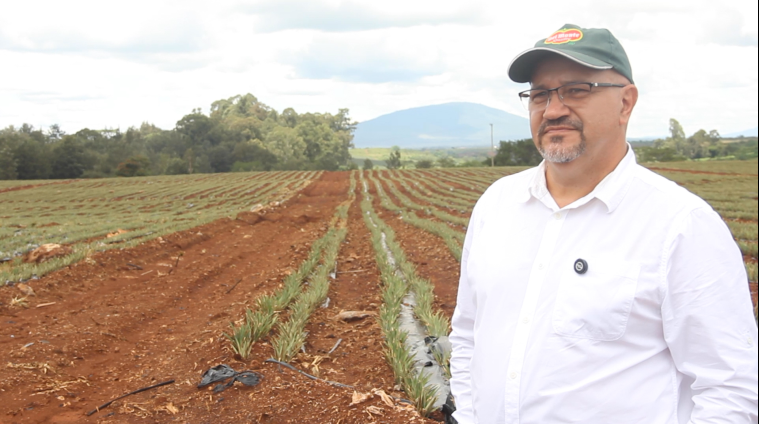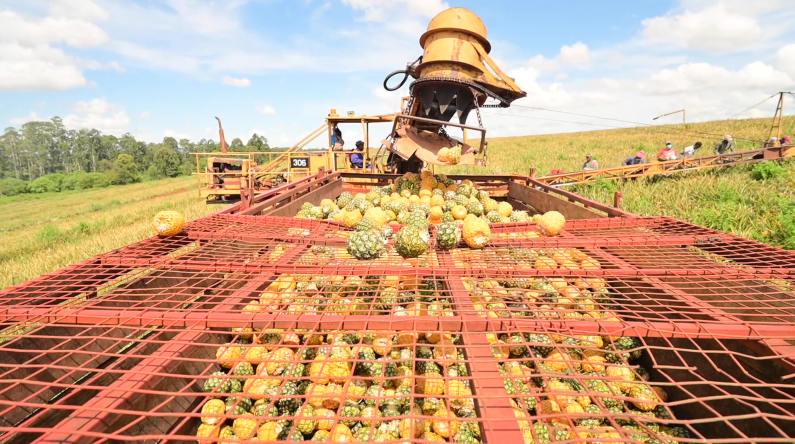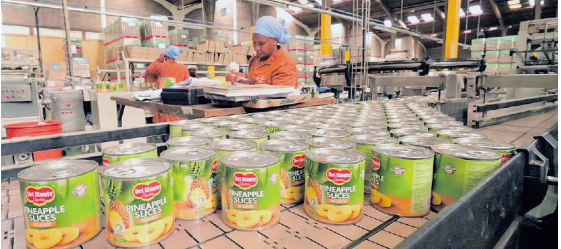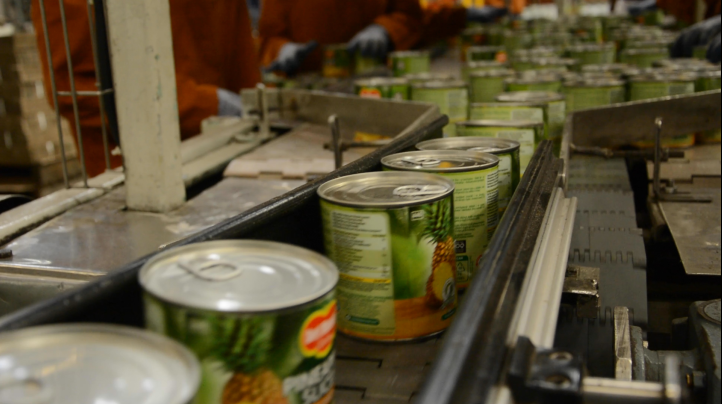
How Del Monte upholds the rights of its workers
The men and women keeping Del Monte’s rich legacy alive speak out.
Water, the very essence of life, is at the core of Del Monte Kenya's sustainability efforts.
In Summary

Audio By Vocalize

In the vibrant, undulating fields of Thika, a profound transformation is quietly unfolding. This change isn't just about growing pineapples; it's about pioneering a new era of agriculture, where cutting-edge technology meets deep-rooted environmental stewardship.
At the heart of this revolution is Del Monte Kenya Ltd., a giant company in the agribusiness sector, which has boldly embraced smart agriculture to mitigate the harsh realities of climate change and secure a resilient future for farming in Kenya.
"Climate change is real, and we feel its impact here every day," says Jorge Miranda, the Agriculture Operations Director at Del Monte Kenya. His words resonate deeply, reflecting the daily challenges faced by farmers across the nation.
In the months of April and May, Kenya's meteorological department issued warnings of continued heavy rains, impacting various counties and leading to widespread flooding.
In contrast, the operation has faced extended periods of lack rains that challenges its irrigation capacity. Such extreme weather events, increasing in frequency and intensity due to climate change, cast a stark spotlight on the country's preparedness.
The nation has witnessed tragic consequences, with dozens of lives lost and thousands of households and acres of crops destroyed in past floods and droughts. This reality has spurred urgent calls from both public and private sectors for innovative water management techniques, pushing companies like Del Monte Kenya to lead by example.
For Del Monte Kenya, this isn't merely a business strategy; it's a fundamental shift in philosophy. "We are not just an agricultural business. We are part of the ecosystem—social and environmental," Miranda asserts.
This holistic perspective underpins the company's drive towards regenerative agriculture, a practice focused on healing the earth, improving soil health, boosting biodiversity, and enhancing the very ecosystem services that sustain life.
"We are not only trying to be sustainable," Miranda explains, "We are trying to regenerate—to give back more than we take." It’s a powerful commitment, recognizing that true progress lies in restoring what has been lost or at risk.
Smart Agriculture: A Tapestry of Innovation
The vast pineapple fields of Del Monte Kenya, stretching across 4,200 net hectares and yielding 200,000 metric tons of pineapples annually, might appear conventional at first glance. But a closer look reveals a sophisticated network of innovations.
This includes precision drip irrigation lines, drone-assisted monitoring, and meticulously managed conservation zones. These elements collectively form the backbone of Del Monte Kenya’s transition to smart farming.
The company's reliance on the MD2, or Del Monte® Gold® variety of pineapple, known for its sweetness and low acidity, demands precision.
"We plant over 70,000 pineapple plants per hectare," Miranda notes. Given that it takes a full 18 months to yield the first pineapple, maintaining high plant density is crucial for ensuring viable harvest volumes.
It's a delicate balance, where every detail matters. "Irrigation makes that possible. Technology makes it reliable," Miranda adds, highlighting the vital role of advanced systems in ensuring year-round planting and harvesting, even outside the rainy season.
 Pineapples are harvested for canning on April 14 /TRACY MUTHONI
Pineapples are harvested for canning on April 14 /TRACY MUTHONI
Sustaining Life: A Deep Commitment to Water
Water, the very essence of life, is at the core of Del Monte Kenya's sustainability efforts. The company has invested hundreds of millions of shillings to upgrade its infrastructure and irrigation systems, particularly along the vital Thika and Athi Rivers.
Del Monte Kenya has also invested in expanding its dam capacity and upgrading its abstraction systems, in order to be more efficient where water is available.
The company employs drip irrigation, which Miranda says uses 40 percent less water than traditional overhead systems.
“Every drop of water is precious now. Drip systems not only save water, they make sure it’s going where it’s needed most — directly to the plant’s roots,” Miranda said.
This investment is not just for its own benefit. Del Monte actively collaborates with other water users and landowners. Together, they work to share, manage, and conserve these precious water resources.
This concerted effort is crucial. It ensures that farmlands in and around these catchment areas are protected from both water scarcity and devastating floods, maintaining optimal production levels throughout the year.
The goal is clear: to ensure sustainable water use boosts productivity. By optimizing every drop, Del Monte Kenya safeguards its operations and contributes to the broader water security of the region. This foresight is critical in a country grappling with increasingly unpredictable weather patterns.
The Biofertilizer Revolution: Transforming Waste into Gold
Perhaps one of the most exciting advancements in Del Monte Kenya's journey towards climate resilience is the pioneering launch of its innovative biofertilizer plant.
This state-of-the-art facility represents a significant leap forward in agricultural innovation. Strategically located near the company’s operations in Thika, this plant takes what was once considered waste – surplus pineapple residues from the cannery – and transforms it into valuable, environmentally-friendly biofertilizers.
Biofertilizers are natural powerhouses. They leverage beneficial microbes to enhance plant growth by increasing the supply of essential nutrients. They also improve soil texture and boost crop yields, offering a sustainable alternative to conventional chemical fertilizers.
This initiative is not just about environmental responsibility; it's also about economic opportunity, especially for smallholder farmers in Kenya, who often struggle with the high cost of traditional chemical fertilizers.
The biofertilizer plant is the result of a strategic partnership between Fresh Del Monte Produce Inc., the parent company of Del Monte Kenya, and Vellsam Materias Bioactivas, a leading producer of biotechnological solutions. Operating under the name De L'Ora Bio, this collaboration signifies the initial step in a broader vision for regenerative production.
"As the largest single exporter of Kenyan products, we are proud to contribute to the advancement of sustainable practices through initiatives like the biofertilizer plant," stated Wayne Cook, Del Monte Kenya's Managing Director.
He emphasized that this investment reflects "our commitment to our people and communities" and positions Kenya as a leader in sustainable agriculture, fostering a "greener and more prosperous future for all."
Mohammad Abu-Ghazaleh, Fresh Del Monte's Chairman and CEO, echoed this sentiment in the company press release, highlighting the company's dedication to creating a circular economy.
"We see this collaboration as a transformative turning point that has the potential to revolutionize how the agricultural industry farms," he said.
He added that De L'Ora "embodies our commitment to innovation, environmental stewardship, and pursuing boundaries of what is possible in agriculture."
The plant, currently undergoing rigorous testing, is fully operational. Initially, the biofertilizers will be used within Del Monte's Kenyan operations; but the company is working towards make them available to other growers in East Africa, with a broader vision for their benefits to ripple across Fresh Del Monte's global footprint.
This move aligns with a global trend; the biofertilizer market is projected to reach an estimated $9.14 billion by 2032, driven by growing awareness of sustainable agriculture and increasing demand for organic food.
Breathing Life into the Land: Tree Planting Initiatives
Beyond the fields and factories, Del Monte Kenya is actively engaged in reforestation efforts, understanding that healthy ecosystems are fundamental to climate resilience.
The company has planted over 8,200 trees as part of its commitment to environmental conservation. This local effort contributes to Fresh Del Monte's ambitious global target of planting 2.5 million trees by 2025.
“We are working hard to protect riparian areas from encroachment. These areas are vital. They maintain the health of rivers like the Thika and ensure water is available not just for us, but for farmers and communities all the way to the sea,” Miranda said.
“Trees offer more than shade. They provide habitat, stabilise soil, improve biodiversity and help regulate local climate.”
This extensive tree-planting initiative, conducted on Del Monte's farms and in surrounding communities, reflects a broader commitment to sustainable practices outlined in the company’s strategic plan.
Del Monte Kenya has collaborated with numerous local partners, including the Kenya Defence Forces, Waternet, Chania Cleaners, the Water Resources Users Association (Njururi Group), and Cascade Company.
Such partnerships are vital for restoring ecosystems and enhancing the quality of life for communities around the company's operations.
The program involves careful site selection, choosing appropriate indigenous tree species, and raising community awareness about tree care and maintenance, ensuring the long-term success of these greening efforts.

The Digital Roots of Growth: Technology and Data in Farming
The success of Del Monte Kenya's smart agriculture initiatives is deeply rooted in its embrace of precision agriculture technologies and geospatial data systems.
Modern sensors provide real-time information on crucial environmental factors like soil moisture, temperature, and nutrient levels. This constant flow of data empowers Del Monte Kenya's agricultural teams.
They can then make precise, informed decisions about irrigation, pest control, fertilization and other practices. This meticulous approach ensures variable rate irrigation, targeted nutrient application and site- specific pest management, minimizing waste and maximizing efficiency.
An integral component of this data-driven approach is the use of geospatial data collection tools. This enables field teams to collect standardized, location-based data which ensures that critical observations—such as crop conditions, pest sightings, and equipment status—are captured accurately and in real-time.
This facilitates swift data analysis and decision-making, while also enhancing coordination across teams.
Beyond ground-level sensors, Del Monte Kenya leverages advanced tools like satellite imagery and drone technology.
These technologies support crop health monitoring through vegetation indices (NDVI), early stress detection, and spatial diagnostics of biotic and abiotic stressors across vast areas. This rapid identification capability means that interventions can be launched much faster, preventing widespread problems and reducing the need for broad-spectrum fertilizer and pesticide applications.
It’s a testament to how technology can transform traditional farming into a highly responsive and sustainable system.
Nurturing the Earth: Advanced Nutrient and Pest Management
A healthy farm begins with healthy soil. Del Monte Kenya's commitment to regenerative agriculture is evident in its advanced nutrient management strategies.
The company employs practices like cover cropping, which involves planting specific crops to protect and enrich the soil between growing seasons.
Composting, using organic waste to create nutrient-rich soil amendments, is also a key practice. Combined with precise nutrient application guided by data, these methods significantly enhance soil fertility and reduce reliance on synthetic fertilizers. This not only lowers the environmental footprint but also creates a more robust and self-sustaining agricultural ecosystem.
For pest and disease management, Del Monte Kenya utilizes integrated pest management (IPM) strategies. IPM is a comprehensive approach that combines sustainable alternatives, with targeted interventions only when necessary. This minimizes the use of chemical pesticides, safeguarding biodiversity and reducing potential environmental impact. It reflects a philosophy of working with nature, rather than against it, to achieve sustainable production.
 Canned pineapples ready for packaging /TRACY MUTHONI
Canned pineapples ready for packaging /TRACY MUTHONI
A Beacon of Progress: Community and Economic Impact
Del Monte Kenya's influence extends far beyond its farm gates. As one of Kenya's largest exporters, the company plays a pivotal role in the nation's economy.
Its products, primarily high- quality pineapples, reach markets across Europe, the Middle East, and America, with thousands of containers shipped annually. This vast export operation positions Kenya at the forefront of agricultural biotechnology, showcasing the country's capacity for innovation in fruit cultivation and processing.
Locally, the company ensures that "Every week, Kenyans can find our pineapples—fresh, high- quality, and locally grown," as Miranda proudly states.
These pineapples are supplied to major supermarkets and fresh produce markets from Mombasa to Kisumu.
Furthermore, Del Monte Kenya is a significant employer in Kenya, directly providing jobs for 6,500 Kenyan workers and thousands of others indirectly. This substantial workforce contributes significantly to the local economy and livelihoods.
The company's commitment to the local community is deeply ingrained in its operations. For over 60 years, Del Monte Kenya has built housing, established medical centers, developed essential water systems, and constructed schools for its workers and the surrounding communities.
This holistic approach to corporate social responsibility, including providing free piped water, firewood, furnishing offices, maintaining roads, and paying electricity bills for community schools, demonstrates a profound dedication to sustainable development goals.
Del Monte Secondary School, for instance, is the first community school in Mitubiri Ward in Murang'a County and receives substantial support from the company.
A Brighter World Tomorrow: The Vision Continues
Del Monte Kenya's journey is an ongoing testament to the power of innovation and commitment. Their vision of "A Brighter World Tomorrow®" is not just a slogan; it's a driving force behind every decision, every investment, and every new initiative.
By integrating smart agriculture practices, embracing sustainable water management, pioneering biofertilizer production, committing to a circular economy, and investing in reforestation, Del Monte Kenya is setting a new benchmark for agribusiness in Kenya and beyond.
The company's efforts are a powerful example of how the private sector can actively contribute to solving global challenges like climate change, while simultaneously fostering economic growth and community well-being.
"Kenya’s agriculture sector must evolve to meet the realities of climate change," Miranda concludes.
"What we are doing at Del Monte is part of that journey towards smarter, greener more responsible agriculture."
It’s a journey that promises a more sustainable, resilient, and prosperous future for Kenya, one pineapple at a time.

The men and women keeping Del Monte’s rich legacy alive speak out.

Del Monte has employed more than 7,700 workers